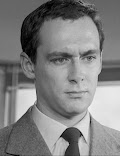 |
| Maurice Ronet as Julien. |
"Near-perfect," I said. After Julien coolly commits the crime, he realizes a critical mistake and quickly heads back to retrieve an incriminating piece of evidence. There's only one problem: It's Saturday and, as Julien rides the elevator to the dead man's office, a security guard shuts off the building's power and departs for the weekend. That leaves Julien trapped between floors.
 |
| A revolver to the head. |
However, the trouble with Elevator to the Gallows is that the rest of the movie can't live up to its brilliant opening. Julien's dilemma in the elevator takes a backseat to two other stories: a rebellious young man and her girlfriend who takes Julien's roadster for an extended joyride and Florence's confusion over Julien's failure to rendezvous at the appointed place and time.
 |
| Moreau bathed in natural lighting. |
In contrast, too much time is spent on the youths played by Georges Poujouly and Yori Bertin. The young man's disenchantment with his monotonous life leads him to assume Julien's identity with disastrous consequences. Malle's challenge is that these characters are not compelling, even though one could argue the angry young man is the forerunner to Jean-Paul Belmondo's reckless "hero" in Godard's 1960 New Wave classic Breathless.
Fans of jazz music may enjoy the improvised soundtrack by jazz legend Miles Davis. It was supposedly recorded in one night while Davis and four other musicians watched scenes from the film.
While Elevator to the Gallows fails to live up to its reputation, it did launch Louis Malle's impressive career, make a star of Jeanne Moreau, and cement Miles Davis's reputation as an influential jazz artist. Those may be sufficient reasons to watch it. However, I still can't help but wish that Elevator to the Gallows could have sustained the brilliance of its opening scenes.








No comments:
Post a Comment